Social Vulnerability and Extreme Weather in Latin-American Studies. 2000-2019
Main Article Content
Abstract
Social vulnerability is a polysemic concept studied by multiple disciplines that seek to explain its causes and characteristics, mainly when extreme weather events occur in a population. Since 2000, this relationship has been analyzed in studies made in Latin America. The objective of this text is to characterize and identify the interactions between social vulnerability debates and extreme weather events through a Systematic Review of Open Access publications in Latin America ranging from 2000-2019 taken from SciELO and Google Scholar. The texts were divided into three types: sociodemographic, political, and environmental factors. Then, the connections between these texts were represented in graphs that were created using the Gephi free software. We identified that land use and conditions of wellness acquire a greater importance depending on state actions and inadequate social protection strategies implemented before an extreme climatic event. The knowledge of the hazards to the population and its survival are related to the organization of a given social group during and after the event. At the same time, this impacts the adaptability and resilience of the population. Furthermore, most extreme weather events are hydrometeorological, with very little consideration for droughts, tornadoes, or extreme heat.

